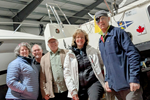FACC optimizes inspection processes through augmented reality
Cooperation with students from the University of Applied Sciences Upper Austria leads to successful use of AR, increasing the efficiency of components testing.
Left to right: Tomas Geri (FACC), Thomas Ecker (FACC), Lena Döberl (student FH Upper Austria), Paul Nasc (student FH Upper Austria) and Franz Obermair (FH Upper Austria). Source | FACC AG
’s (Ried im Innkreis, Austria) quality engineering team recently implemented a digitally supported inspection solution using augmented reality (AR), which has now been successfully tested in cooperation with students of the Smart Production and Management degree program at the University of Applied Sciences Upper Austria. FACC says that the novel testing method is not specifically tied to any material, however, composite materials being the company’s main focus, it is clear that the system could be used for these kinds of applications.
“With the newly developed digital inspection, we are establishing an additional efficient and precise inspection method that offers significant advantages compared to conventional inspection methods,” says CEO Robert Machtlinger, emphasizing the added value of the research project for FACC.
With AR, digital information is integrated into the user’s environment in real time. This is done using a tablet on which the live image of a component is superimposed with the digital content generated by a software program. The AR software, which was specially developed for industrial applications, projects inspection instructions as digital 3D overlays directly onto the respective test object. “By automatically navigating to each inspection point and the mandatory confirmation of conformity, we minimize the risk of errors and deviations,” explains Thomas Ecker, program engineer and head of the student project at FACC. “This enables us to detect errors at an early stage and ensures product quality.”
According to FACC, the AR-supported solution offers a much faster inspection, especially for large and complex components. The automated documentation of the test results and the structured process improve quality assurance. FACC also sees potential for other areas of application in production and also in maintenance and repair work. The successful company project together with the University of Applied Sciences Upper Austria illustrates the potential of practice-oriented research and shows how digitization can be further advanced in the aviation industry.
Related Content
-
Automated robotic NDT enhances capabilities for composites
Kineco Kaman Composites India uses a bespoke Fill Accubot ultrasonic testing system to boost inspection efficiency and productivity.
-
University of Bristol launches composite materials to space for ISS testing
Next-gen carbon fiber materials will be tested under extreme conditions for 12-18 months to determine their viability in space for use in future space bases, interplanetary travel.
-
Determining steel/composite failure load of bonded repair assemblies
Bureau Veritas and partners use a novel equivalent interface test specimen and simulation to predict failure load in bonded composite patch repairs to steel structures.



